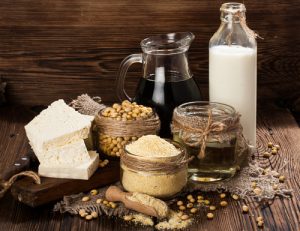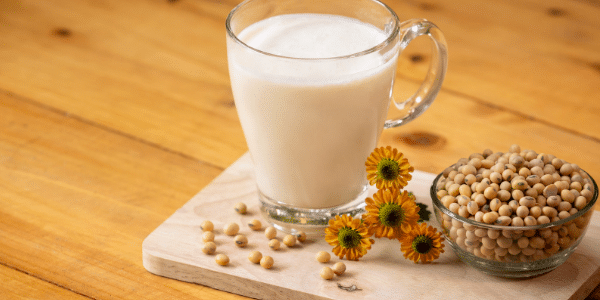Soy products contain a high concentration of phytoestrogens, compounds that bind to estrogen receptors in the bodies of both men and women, often leading to serious complications to the overall function of the endocrine (hormone) system and wreaking havoc on aging hormones. In this guide, we’ll discuss the impact of soy on aging hormones, why you should be aware of the threat and how you can minimize soy intake in your diet.
Soy Mimics Natural Hormones
The human endocrine system is a complex web of molecules that spur a number of important functions among various organs. The main sex hormones in humans are estrogen, testosterone and progesterone. These three must exists in a proper balance in both men and women to maintain health.
Soy is potentially damaging to hormonal health because of its phytoestrogen content that binds to estrogen receptors with potentially devastating effects. Men are especially vulnerable to the harmful effects of too much estrogen. Testosterone levels decline naturally with age, falling about one percent each year. Excessive estrogenic activity within the body can accelerate the likelihood of serious imbalances, causing a number of uncomfortable and often embarrassing side effects, including breast tissue growth.
Soy Is Everywhere

Food manufacturers prefer soy over other substances for a variety of reasons. First, it is easily grown and cheap. Huge agricultural giants produce the world’s ever-increasing supply of soy, often at a high cost to the local environment and ecosystems.
Canned soup, canned fish, cereals, peanut butter, processed baked goods (crackers, cookies, etc.) and cooking oils all contain excessive amounts of soy. Even worse, because many products like olive oil are costly to produce, many unscrupulous manufacturers slip soybean oil into their products as “filler,” meaning that when consumers are eating healthy olive oil, they might actually be eating soy. Always purchase your food from reputable manufacturers.
Soy as a Possible Treatment for Menopause
Although the phytoestrogens in soy generally have a negative impact on aging hormones, some women have found relief from severe menopause symptoms by including soy in their diet.
Menopause occurs when significant hormonal realignment takes place within a woman’s body, including dropping estrogen levels that are no longer needed for reproduction. The drop in estrogen can come with accompanying hot flashes, insomnia, irritability and other even more serious concerns like brittle bones.
If you are a woman who is experiencing menopause, consider asking your doctor about supplementing with soy to potentially alleviate symptoms associated with aging hormones.
Avoiding Soy Is Essential for Protecting Hormonal Health
Except in the case of women using soy as a potential treatment for menopause, people should strive to limit their soy intake. This can be achieved by carefully reading food labels. The FDA requires clear labeling of soy as a potential allergen, so spotting it in your favorite processed foods should be easy.
Try to incorporate as many whole foods into your diet as possible. In addition to being beneficial for overall health, this type of eating habit can also help restore the full function of aging hormones.





